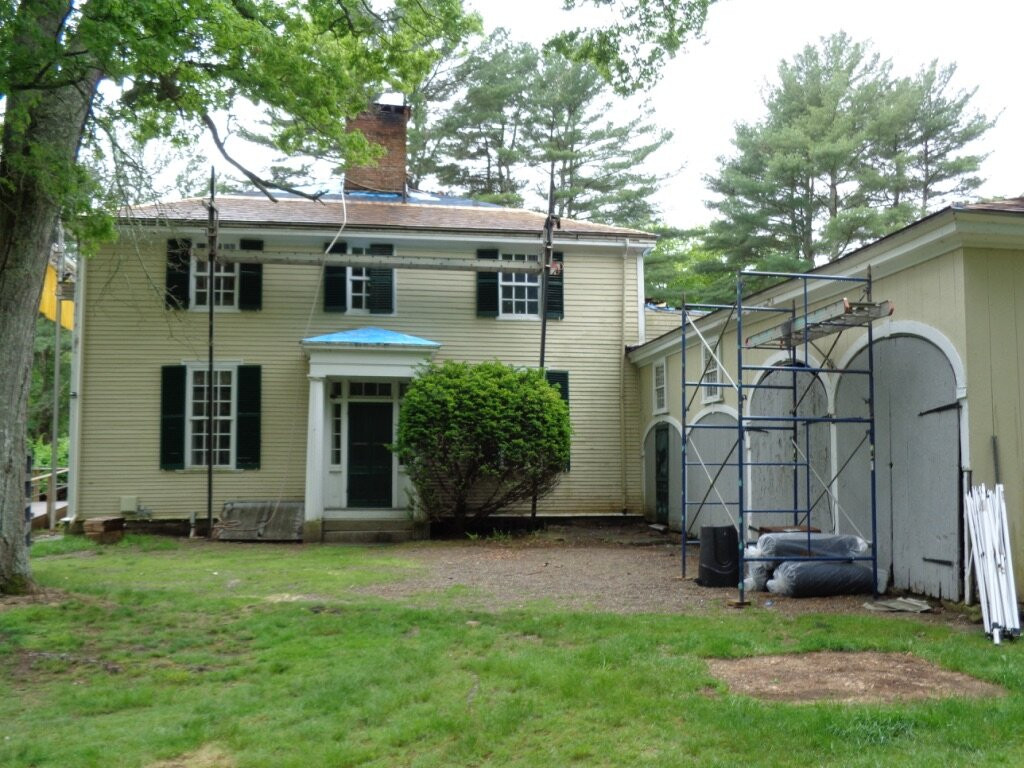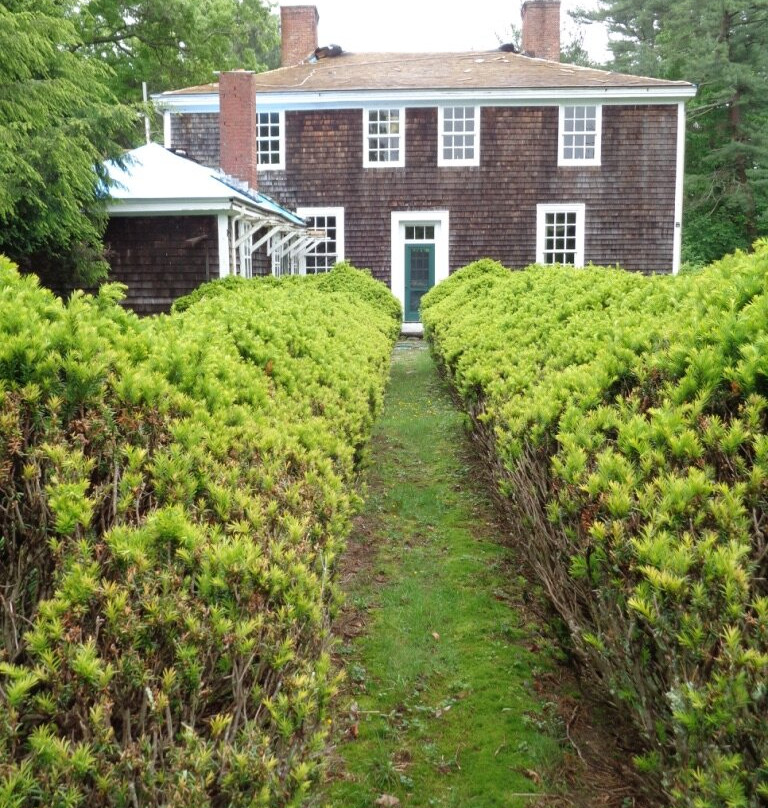的点评
The Oliver Estate: Two Sides of History
The Oliver Estate的点评
点评:The Oliver Estate was owned by my maternal grandfather Henry Champion Jones, and then his heirs, from 1893 until the mid-1940s, and I have visited the house periodically over the years – from 1959 through the recent years when much-needed restoration work was undertaken. While my family no longer has any material stake in the property or its management, I continue to follow its progress with interest; it's a remarkable place.
The Estate, if its real history is understood, symbolizes both sides of the American Revolution: constructed by the Loyalist Oliver family, initially highly-respected and well-established in the Colonies, it suffered a significant reversal as the Revolution approached. Its original inhabitant, Dr. Peter Oliver, Jr., was twice confronted at the house by mobs who threatened to burn the place down if he did not cut his ties to the Crown. (Its much larger, and at the time much more famous, counterpart across the Nemasket River – the enormous estate that was home to the senior Peter Oliver, Magistrate – was in fact eventually burned to the ground, late in the war.) The Olivers were forced to leave Massachusetts, eventually returning to England. On the one hand, the surviving Oliver mansion represents the eventual victory of the Colonials over the British; on the other, it is a reminder of the human cost of the war – and the potential cost of loyalty to a system no longer supported by those whose lives and aspirations it is supposed to serve.
Only a very limited amount remains of the extensive landscaping done by my grandfather, a trained botanist with ties to Harvard University's famed Arnold Arboretum. But the grounds remain quite beautiful, and the house itself is a striking example of Colonial architecture. For anyone with a sincere interest in the origins and the ultimate realities of the Revolution, this is a very special spot to visit.
The Estate, if its real history is understood, symbolizes both sides of the American Revolution: constructed by the Loyalist Oliver family, initially highly-respected and well-established in the Colonies, it suffered a significant reversal as the Revolution approached. Its original inhabitant, Dr. Peter Oliver, Jr., was twice confronted at the house by mobs who threatened to burn the place down if he did not cut his ties to the Crown. (Its much larger, and at the time much more famous, counterpart across the Nemasket River – the enormous estate that was home to the senior Peter Oliver, Magistrate – was in fact eventually burned to the ground, late in the war.) The Olivers were forced to leave Massachusetts, eventually returning to England. On the one hand, the surviving Oliver mansion represents the eventual victory of the Colonials over the British; on the other, it is a reminder of the human cost of the war – and the potential cost of loyalty to a system no longer supported by those whose lives and aspirations it is supposed to serve.
Only a very limited amount remains of the extensive landscaping done by my grandfather, a trained botanist with ties to Harvard University's famed Arnold Arboretum. But the grounds remain quite beautiful, and the house itself is a striking example of Colonial architecture. For anyone with a sincere interest in the origins and the ultimate realities of the Revolution, this is a very special spot to visit.
翻译:奥利弗庄园从 1893 年到 20 世纪 40 年代中期一直归我外祖父亨利·查皮恩·琼斯 (Henry Champion Jones) 及其继承人所有,多年来我定期拜访这座庄园——从 1959 年到最近几年,当时庄园进行了急需的修复工作。虽然我的家人不再拥有该房产或其管理的任何物质利益,但我仍然饶有兴趣地关注着它的进展;这是一个了不起的地方。
如果了解了庄园的真实历史,它象征着美国革命的两个方面:庄园由效忠派奥利弗家族建造,最初在殖民地备受尊敬和根基稳固,但随着革命的临近,庄园遭遇了重大挫折。它的原始居民彼得·奥利弗博士 (Dr. Peter Oliver, Jr.) 曾两次在庄园内被暴徒拦住,他们威胁说,如果他不切断与王室的联系,他们就会烧毁庄园。 (其规模更大、当时也更出名的对应物位于内马斯克特河对岸——高级治安官彼得·奥利弗的住所——最终在战争后期被烧毁。)奥利弗一家被迫离开马萨诸塞州,最终返回英格兰。一方面,幸存的奥利弗豪宅代表着殖民者最终战胜了英国;另一方面,它提醒人们战争的人员伤亡——以及对一个不再得到那些本应为之服务的人的支持的制度的忠诚的潜在代价。
我祖父是一位训练有素的植物学家,与哈佛大学著名的阿诺德植物园有联系,他所做的大面积景观只剩下非常有限的部分。但场地仍然非常美丽,房子本身就是殖民时期建筑的一个典型例子。对于任何对革命的起源和最终现实真正感兴趣的人来说,这是一个非常特别的参观地点。
如果了解了庄园的真实历史,它象征着美国革命的两个方面:庄园由效忠派奥利弗家族建造,最初在殖民地备受尊敬和根基稳固,但随着革命的临近,庄园遭遇了重大挫折。它的原始居民彼得·奥利弗博士 (Dr. Peter Oliver, Jr.) 曾两次在庄园内被暴徒拦住,他们威胁说,如果他不切断与王室的联系,他们就会烧毁庄园。 (其规模更大、当时也更出名的对应物位于内马斯克特河对岸——高级治安官彼得·奥利弗的住所——最终在战争后期被烧毁。)奥利弗一家被迫离开马萨诸塞州,最终返回英格兰。一方面,幸存的奥利弗豪宅代表着殖民者最终战胜了英国;另一方面,它提醒人们战争的人员伤亡——以及对一个不再得到那些本应为之服务的人的支持的制度的忠诚的潜在代价。
我祖父是一位训练有素的植物学家,与哈佛大学著名的阿诺德植物园有联系,他所做的大面积景观只剩下非常有限的部分。但场地仍然非常美丽,房子本身就是殖民时期建筑的一个典型例子。对于任何对革命的起源和最终现实真正感兴趣的人来说,这是一个非常特别的参观地点。


此点评仅代表旅行者个人的主观意见,并不代表TripAdvisor以及其合作方的意见。
关于我们
|新闻动态
|商务合作
|会员中心
|业主中心
|常见问题
|意见反馈
|联系我们
|营业执照
© 2025 Tripadvisor 版权所有。
使用条款 |隐私政策 |网站工作原理
部分照片由 VFM Leonardo 提供。
* Tripadvisor不是旅行社,也不是旅游预订服务代理商。我们提供免费、客观、公正的旅游资讯服务。 (显示更多)
TripAdvisor LLC 既不是预订代理商,也不是旅游运营商,不会向网站用户收取任何服务费。 按照规定,在 Tripadvisor 发布机票价格、游览和旅行套餐的合作伙伴(航空公司、旅行提供商及预订代理商),其标价须包含所有费用和附加费用。 例如, 机场出入境税费、消费税与其他服务费、手续费、杂费及附加费用。 当您向我们的某个合作伙伴进行预订时,请务必查阅他们的网站以了解当地行政部门要求的所有适用费用的具体情况。 除非另有说明,机票价格通常指的是一个人的价格(以人民币计)。
为方便起见,TripAdvisor LLC 根据从我们的预订合作伙伴获取的空房率计算每个酒店的均价。 对于游览和景点来说,所显示价格通常是每位成人的最低可用价格。 对于列出的任何旅行套餐或优惠,TripAdvisor LLC 无法保证任何特定的费率或价格。 此外,酒店均价每晚会更新,并以您的首选币种表示(使用现行汇率)。 由于这些已换算的价格是预估价格,因此,有关具体金额和币种请与预订网站进行核实。
此外,TripAdvisor LLC 无法保证我们网站上宣传的价格随时有效。 标价可能需要预订一定天数才能生效,或有不可用日期、使用条件或限制。
TripAdvisor公司对外部网站的内容一概不负责。优惠价格中不含税和其他费用。
ICP证:沪B2-20200433
沪ICP备20013175号
 沪公网安备31010502005427号
沪公网安备31010502005427号鹰程信息技术(上海)有限公司
货币/国家及地区
¥CNY
中国

